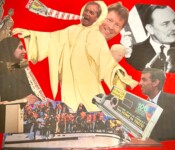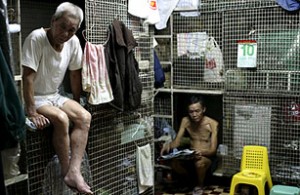‘Journos Abroad’ Democracy in Hong Kong?
“People’s aspirations has galvanised a yearning for democracy” says CK Lau, lecturer at Hong Kong Baptist University and Vice-Chairman of the Journalism Education Foundation.

C.K. Lau university lecturer Vice-Chairman of the Journalism Education Foundation chairing the 3rd Pulitzer Prize Winners Workshop.
Yet the upcoming Hong Kong Chief Executive election seems to be anything but. Three candidates, but the media has already written off the only non-Beijing supporter Albert Ho.
C. Y. Leung and Henry Tang, aka “the pig and the wolf” will be battling for the 1200 votes of the Hong Kong election committee. Leung, the wolf, has been described by top Chinese leaders as “very patriotic”, but the public are more concerned with his alleged membership of the Communist party.
According to Lau, that is but a fraction of the controversies surrounding the two candidates:
“So many allegations; Henry Tang had extramarital affair and built an illegal two-house big basement which he had submitted as a wine cellar. Leung was 10 years ago involved in construction projects in West Kowloon with huge personal financial interest. There have also been allegations of Beijing lobbying for his campaign, but no proof.
People have been campaigning much less this election, as if they feel it doesn’t matter. It is expected to be very small amount of voting as well. The two candidates campaigns for public support have been extraordinarily big though. People are looking forward to another try in 2020.”
Both candidates are under police investigations over possible Triad connections, infamous “Shanghai Boy” Kwok Wing-hung stating he had dinner with Tang in Japan in 2002.
Leung’s misdeeds also touched HKBU, when a political survey done by the journalism students were released early while showing a Leung lead, creating a stir over whether it was rigged and the ensuing media storm forced the dean of the school of communications Zhao Xinshu to resign.
Sam Sky Wild, journalist born in the Wild communes of the 70s, also touched on democracy at a screening of his documentary “Hong Kong: Life in the shadows” at Hong Kong Baptist University:
“As you could see from the credits there were many people, especially politicians, who never got back to me about appearing in this movie, but many more than that were people I simply didn’t bother getting in contact with as it was obvious I wouldn’t get a response.”
Wild’s documentary’s name refers not only to the people living in the shadows of the most vertical city in the world, but also the shadow of Beijing which envelops the political situation heavily.
The Hong Kong-Zhuhai-Macau bridge, a $2 billion project fuelled one of the biggest and most violent demonstrations in 2003 in Hong Kong history, as the people saw it as complete disregard of their wishes. Created to boost the economy and strengthen the link between the city and mainland China, the Hong Kong population had much rather seen the money spent on improving their living standards.
As Wild’s documentary showed many Hong Kongers live in poverty, some in “cages”, a term describing actual animal cages with a madras stacked on each other on rooftops.
























